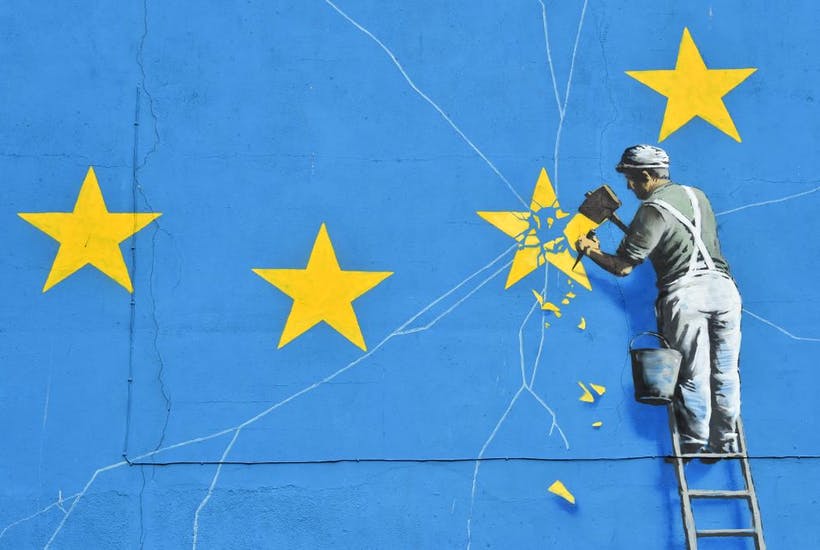Whatever your feelings about Brexit, this day, 31 January, 2020, will be seen as a point in history. It is the day that the UK left the European Union after nearly half a century and set out, once again, on its own. While we may have been through more than three years of parliamentary wrangling, two elections and something akin to a constitutional crisis to get here, the actual day itself is being marked with characteristic understatement – just a little bit.
Bongs from Big Ben were ruled out with two weeks to go, a flag display promised as consolation. No one even dreamt of demanding that Westminster Abbey peal its bells. Yes, there are splendid flags lining the Mall – as for a State visit to ourselves – but it’s not as though they are flaunting their presence; you have to know they are there. You can hardly glimpse them, even from Trafalgar Square.
The flags flying on Parliament Square – the official concession to the Big Ben lobby – look almost pathetically sparse. It is a minimalist effort, with the poles erected on one side only (the side opposite Parliament), and nothing like the all-four sides festive forest that flutters joyously to celebrate Commonwealth or (once upon a time) Europe Day.
We were outdone, for heaven’s sake, by the Belgians, who managed to put on a more wholehearted show of Britishness, with a light show at the Grand Place the previous evening and the Mannequin Pis dressed up in the Union flag. Even the Eurocrats, bless them, had played out the UK’s departing MEPs with a rendition of Auld Lang Syne (though by no means all of them knew how to link arms).
But it is in the broadcasting schedules that the genius of celebrating (or mourning) “just a little bit” comes into its own. Given that we are indeed marking history, you might have expected the whole evening, if not the whole day, to be devoted to this national landmark. You would be wrong. The tumultuous saga of our vexed recent relations with Europe was confined to a few long documentaries aired in advance, most of them discreetly parked on BBC Four.
Nigel Farage, the man who it can be argued had single-handedly changed the UK’s 21st century trajectory without ever winning a UK Parliamentary majority or even a Parliamentary seat, was accorded just one biographical programme, on Channel 4, a safe two days before actual Brexit Day. And it chronicled only the past few months when, frankly, Farage has seemed at times isolated and past his prime.
Now look at the schedule for Brexit Night itself. Living through history looks almost to be an inconvenience to the smooth running of normal programming on a Friday night. There is no fixed slot for the Prime Minister’s address.
Most channels are simply expanding their main evening news programmes; starting a bit early, ending a bit late. But no dramatic disruption to normal business. And it is hard not to see barely hidden messages in some of their other offerings.
BBC One, for instance, offers as warm-up acts for its 10 o’clock news “special” “The Goes Wrong Show” and “Would I Lie to You?”. BBC Two meanwhile has “Road to Brexit”, which you might think was a context-setting prelude to the serious business of ‘Newsnight’ but is actually a “One-off comedy special”. At five to midnight it is offering the 2013 film of…‘Romeo and Juliet”. Any lessons for our divided nation there?
Channel 4’s final episode of ‘Deadwater Fall’ is summarised as showing “villagers try to rebuild their lives. They have to learn to be honest with themselves and with each other….” Oh yes, and the guests for the suitably sober-sounding “Countdown to Brexit” that follows include Armando Iannucci for a “comic review of the last seven days”. For most other terrestrial and audio channels it is business as usual with not even a nod to the fateful hour. BBC Radio 3 takes a particularly detached view. As 11pm approaches, it will be treating listeners to a programme entitled “The Verb”.
In short, the Brexiteers may be whooping it up on Parliament Square and some Remainers drowning their sorrows in the produce of EU vineyards in the privacy of their own homes, but the historic significance of the day and the hour will be reduced to the projection of a clock on to Downing Street and not a whole lot besides. “Just a little bit” might be the motto of the day.






Comments